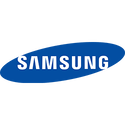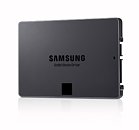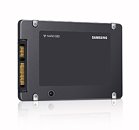Tuesday, August 7th 2018

Samsung starts Mass Production of QLC Consumer SSDs, 1 TB, 2 TB, 4 TB with over 520 MB/s Read/Write
Samsung Electronics, the world leader in advanced memory technology, today announced that it has begun mass producing the industry's first 4-bit (QLC, quad-level cell) 4-terabyte (TB) SATA solid-state drive (SSD) for consumers.
Based on 1-terabit (Tb) V-NAND with outstanding performance equivalent to the company's 3-bit design, Samsung's QLC SSD is expected to bring a new level of efficiency to consumer SSDs."Samsung's new 4-bit SATA SSD will herald a massive move to terabyte-SSDs for consumers," said Jaesoo Han, executive vice president of memory sales & marketing at Samsung Electronics. "As we expand our lineup across consumer segments and to the enterprise, 4-bit terabyte-SSD products will rapidly spread throughout the entire market."
With its new 1Tb 4-bit V-NAND chip, Samsung will be able to efficiently produce a 128GB memory card for smartphones that will lead the charge toward higher capacities for high-performance memory storage.
Typically, as data stored within a memory cell increases from three bits to four, the chip capacity per unit area would rise and the electrical charge (used to determine information from a sensor) would decrease by as much as 50 percent, making it considerably more difficult to maintain a device's desired performance and speed.
However, Samsung's 4-bit 4TB QLC SATA SSD maintains its performance levels at the same level as a 3-bit SSD, by using a 3-bit SSD controller and TurboWrite technology, while increasing drive capacity through the use of 32 chips, all based on 64-layer fourth-generation 1Tb V-NAND.*
The 4-bit QLC SSD enables a sequential read speed of 540 MB/s and a sequential write speed of 520 MB/s, and comes with a three-year warranty.
Samsung plans to introduce several 4-bit consumer SSDs later this year with 1TB, 2TB, and 4TB capacities in the widely used 2.5-inch form factor.
Since introducing the 32-gigabyte (GB) 1-bit SSD in 2006, which ushered in the PC SSD era, to today's 4TB 4-bit SSD, Samsung continues to drive new thresholds for each multi-bit generation.
In addition, the company expects to provide M.2 NVMe SSDs for the enterprise this year and begin mass production of 4-bit fifth-generation V-NAND. This will considerably expand its SSD lineup to meet the growing demand for faster, more reliable performance across a wide span of applications, such as next generation data centers, enterprise servers, and enterprise storage.
Based on 1-terabit (Tb) V-NAND with outstanding performance equivalent to the company's 3-bit design, Samsung's QLC SSD is expected to bring a new level of efficiency to consumer SSDs."Samsung's new 4-bit SATA SSD will herald a massive move to terabyte-SSDs for consumers," said Jaesoo Han, executive vice president of memory sales & marketing at Samsung Electronics. "As we expand our lineup across consumer segments and to the enterprise, 4-bit terabyte-SSD products will rapidly spread throughout the entire market."
With its new 1Tb 4-bit V-NAND chip, Samsung will be able to efficiently produce a 128GB memory card for smartphones that will lead the charge toward higher capacities for high-performance memory storage.
Typically, as data stored within a memory cell increases from three bits to four, the chip capacity per unit area would rise and the electrical charge (used to determine information from a sensor) would decrease by as much as 50 percent, making it considerably more difficult to maintain a device's desired performance and speed.
However, Samsung's 4-bit 4TB QLC SATA SSD maintains its performance levels at the same level as a 3-bit SSD, by using a 3-bit SSD controller and TurboWrite technology, while increasing drive capacity through the use of 32 chips, all based on 64-layer fourth-generation 1Tb V-NAND.*
The 4-bit QLC SSD enables a sequential read speed of 540 MB/s and a sequential write speed of 520 MB/s, and comes with a three-year warranty.
Samsung plans to introduce several 4-bit consumer SSDs later this year with 1TB, 2TB, and 4TB capacities in the widely used 2.5-inch form factor.
Since introducing the 32-gigabyte (GB) 1-bit SSD in 2006, which ushered in the PC SSD era, to today's 4TB 4-bit SSD, Samsung continues to drive new thresholds for each multi-bit generation.
In addition, the company expects to provide M.2 NVMe SSDs for the enterprise this year and begin mass production of 4-bit fifth-generation V-NAND. This will considerably expand its SSD lineup to meet the growing demand for faster, more reliable performance across a wide span of applications, such as next generation data centers, enterprise servers, and enterprise storage.


25 Comments on Samsung starts Mass Production of QLC Consumer SSDs, 1 TB, 2 TB, 4 TB with over 520 MB/s Read/Write
1TB=100$
2TB =150$
4TB=200$
No use to me if 512Gb is enough for my needs.
New generation computers (both laptops and PCs) have double drive systems SSD+HDD.
People are using SSDs as operating system drives and HDDs for storage.
But according to me when you use double drive systems, nothing changes.
I have a laptop with an SSD and HDD. SSD for the operating system and HDD for the storage.
But whenever I turn on the laptop, first of all HDD starts to run! The first noise I hear is the HDD's spinning noise. And I hate! from this.
A few days ago I detached the HDD.
Now there is only SSD in the laptop and I noticed that "system is completely silent, cooler and faster". And battery lasts longer.
If you have a double drive system SSD+HDD, you will not benefit from your SSD 100%. HDD will try to start firs!
SSD only systems are unique.
A lot of people are asking for the P/E cycles?
Do not worry about the P/E cycles.
Even the QLC SSDs have enough cycles for consumers.
This process will follow to mature. And SSD drives will replace the HDD drives in the future.
Prices will fall. Capacities and speeds will increase.
Even the worst SSD is much better than the best HDD.
Please look at that.
img.global.news.samsung.com/global/wp-content/uploads/2018/06/8TB-NVMe-NF1-SSD-4_main.jpg
8TB SSD drive with (11cm x 3.05 cm) size. And app. 10 gram.
NVMe 1.3 protocol and PCIe 4.0 interface, delivering sequential read speeds of 3,100 megabytes per second (MB/s) and write speeds of 2,000MB/s.
news.samsung.com/global/samsung-introduces-8tb-ssd-for-data-centers-in-next-generation-nf1-form-factor
And now look at that.
8TB HDD drive with (26 x 10 x 15 cm) size. And 605 gram. Only 190MB read speed.
www.seagate.com/www-content/datasheets/pdfs/exos-5e8DS1954-2-1712US-en_US.pdf
Which of these would you prefer?
1 - 10 gram / 11cm x 3.05 cm / 3100 MB read - 2000 MB write / zero noise
2 - 605 grm / 26 x 10 x 15 cm / 190 MB read.
?
Still, HDDs have no place in laptops (or really consumer desktops either, outside of those who have particular storage needs). Outside of my HTPC, I haven't used a PC with a HDD in it for quite a few years.
On the other hand, consumer NAS adoption pretty much needs to accelerate, given the vast amounts of data the average user produces these days. And for mass storage of cold or semi-cold data, HDDs are excellent. If we move our mass storage (and thus HDDs) into a separate device, we get to keep the best of both worlds - compactness, silence and power efficiency all the time, capacity when we need it.
In likely case you don't know how Flash memory works QLC needs to distinguish 16 charge levels to avoid error/data corruption.
That's starting to be basically semi analog recording, leaving very little room for charge to degrade/leak etc.
While biggest advantage of digital is its reliability in allowing considerable signal degradation without any effect to actual data...
Be off with you fool.